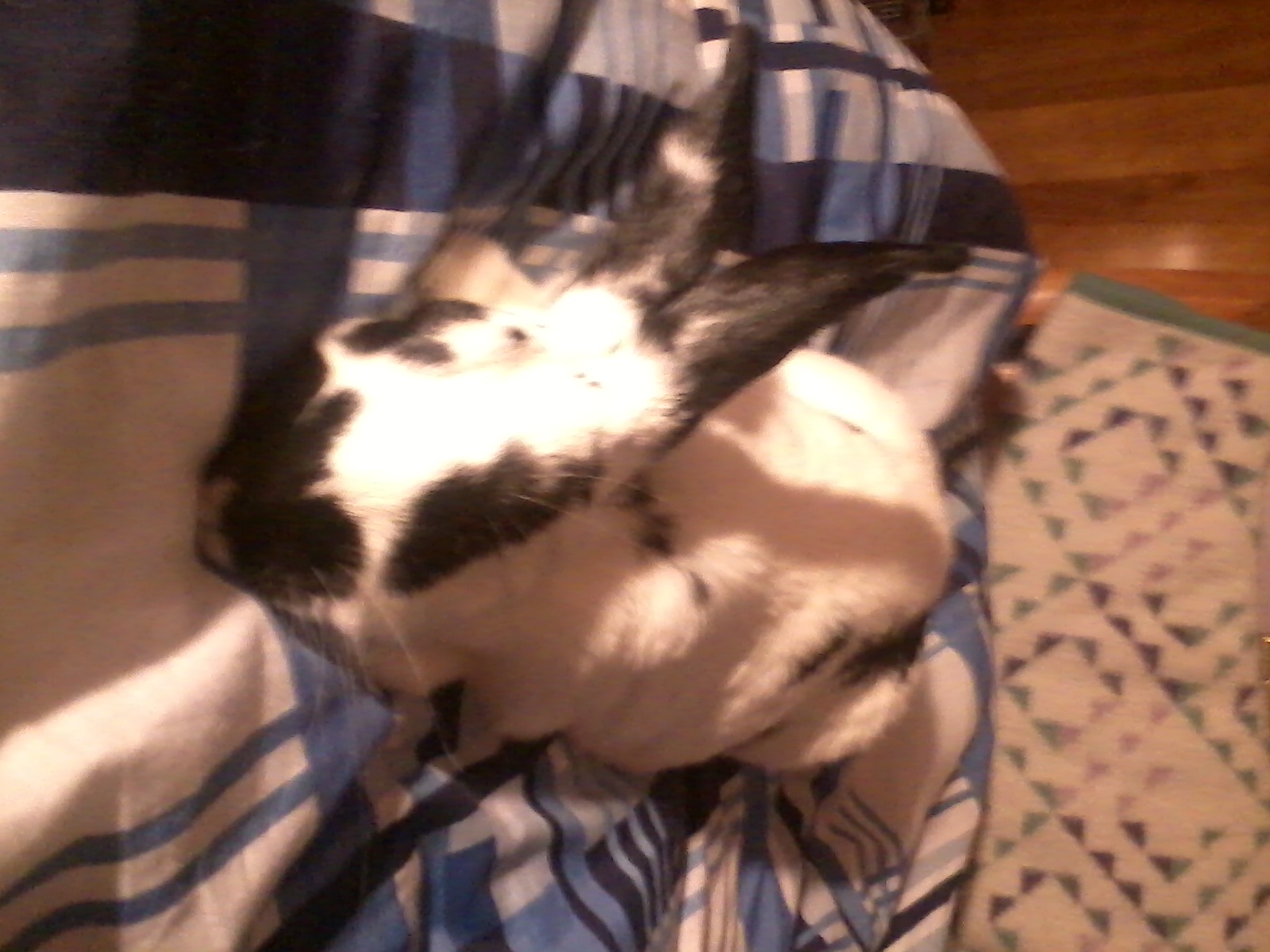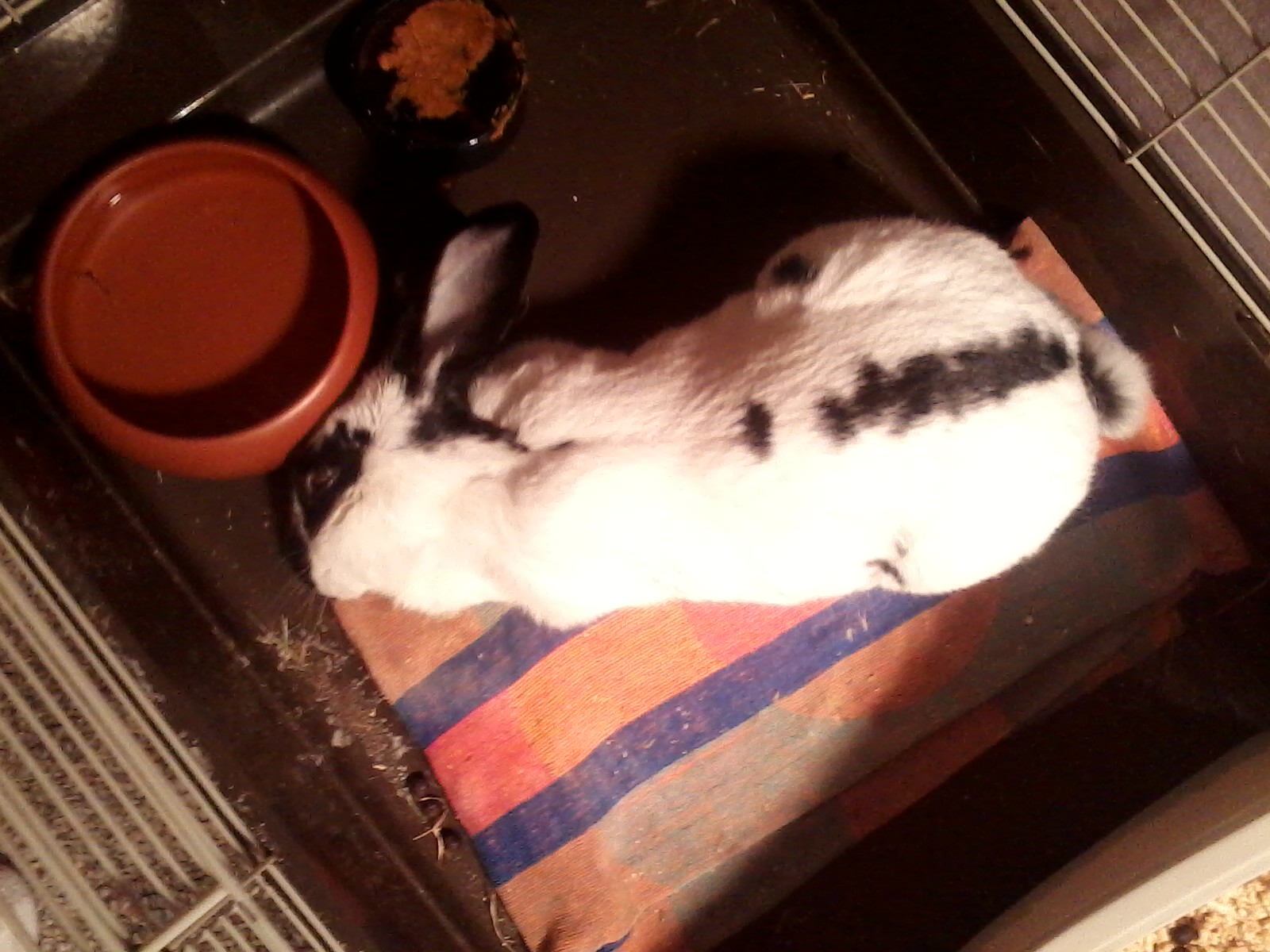Thursday started normally:
- 6:00 AM each of 5 upstairs bunnies getting personal grooming.
- 9:00 AM everyone in for nap time.
- 10:00 AM Lyra (3 years old) is very sick, can not lift her head, call to find which rabbit vet is available.
- 10:30 AM everyone is at a conference but one, who is out for the morning.
Additional symptoms include head tilts to either side when she lays stretched out. Around 10:30 AM I have moved her to carrier with towels supporting her. One pupil is dilated, her anxiety is high.
- 10:45 AM Lyra passes away.
- 2:30 PM speaking to the only rabbit vet still in town.
- 3:30 PM in his office for a post-mortem examination. Rapid onset leaves two options: stroke or trauma.
- 4:00 PM X-ray is clear. Combined with video I took of the symptoms the diagnosis is a stroke.
- 4:45 PM at the crematorium.
- 6:00 PM leaving the crematorium with the ashes in the urn we picked out 3 weeks ago for our geriatric bunny Baxter (11 years old) while pre-shopping. He is still doing OK. Harmony (7 years old) is Lyra's bond mate, a bit sad but OK. As are all the other rabbits in the house.
Friday morning:
- 4:00 AM Ruby (3 years old) is not sleeping in her normal place on the floor at the foot of my bed. I find her hiding under the bed in her 'comfort' corner. She refuses to come when called. I get her out and up on the bed. She is moving fine, but when she lays still for several minutes her head tilts to the right side.

- 5:30 AM Ruby is getting worse, pronounced head tilt to the right, when laying in her 'room' next to her water bowl. She did manage to eat some pumpkin. I put up an exercise pen to keep her from going under the bed.

6:00 AM Ruby can not lift her head, very similar to Lyra, and I think "not again, please". Lucille begins calling to find an available emergency rabbit vet. I begin searching the internet and on MediRabbit we find “head-down syndrome” in a rabbit Nothing else similar is found. Good news are that all affected rabbit recovered within a week.
8:50 AM yesterday's rabbit vet is not available for several more hours. Found another one who is available for an emergency visit. This vet has never seen a rabbit with these symptoms present. He searches the exotic veterinary forum (I can't remember the name of it). Ruby lifts her head a couple times. Seems like she might be getting better already, it must be the head down syndrome. Just to be proactive he gives her a shot of long acting Penicillin G one of the few types that is safe for rabbits.
Videos: Ruby 1, Ruby 2, Ruby 3, Ruby tries to eat a pellet of food.
We head home feeling much better.
Noon - we are back home. We stopped by the feed store and picked up a couple more bales of hay and and some bags of wood pellet liter. One of the three downstairs bunnies is dead. Everything was fine this morning. His bond mate is fine. Something significant is going on, I post the videos online and we start calling, the primary rabbit vet in the area is contacted at the conference.
1:00 PM we are back at the office of the vet from Thursday, with the dead rabbit for a full autopsy, and Ruby for a second opinion, as "Head-down syndrome - all affected rabbits recovered within a week" seems unlikely. He also has never seen a bunny present like this. E. cuniculi (EC) and ear infections are ruled out. Progress is too fast for either of them. He reaches out to several nationally recognized rabbit vets, but response is not immediate. After some time, he recalls similar symptoms in geese, does some research and we have a new probable diagnosis: botulism from the hay. This is recognized issue with horses.
3:30 PM we are back home, everyone else is still ok. We empty all the hay racks and put that hay aside, it will be going off to be tested.
10:00 PM everything seems stable. We are dosing everyone with Vitamin B 0.25ml per the vet from the conference. Ruby will be seeing him on Monday, for a follow up.
Saturday morning:
Ruby is about the same as last night; 90% paralyzed from the middle of her back forward. She is maintaining her good bowel and bladder habits. I slept on the floor with her all night, she woke me up every hour or two to take to the litter box. If someone is not laying with her she gets scared and tries to move to much and seems like she could hurt herself.
Sunday morning:
Ruby was stable most of yesterday, with a veracious appetite (eating moistened critical care and pellets out a bowl), with her appetite dropping off at bed time.
She woke me up just before 2 AM this morning to take her to the litter box. I left her for a while so she could poop. When I brought her back to bed her paralysis had increased significantly. Her rear legs have gone from 100% function to maybe 10-20%. She snuggled with me throughout the night giving lots of teeth chatters (bun purs), other than her mouth she has lost most of the remaining head and upper body control. Continuing Sub-Q fluids, she took a couple of bites of breakfast, unsure if this is lack of appetite, or if trying to eat is to much work.
Monday morning (this should be the final update describing the symptoms, we seem to be stable and entering the recovery phase of the illness):
Stable for 24 hours now, no new deterioration last night. Yesterday I gave 1 ml of Reglan (metoclopramide) and her appetite returned. She continues to enjoy snuggling, body paralysis seems be equal, with about 10% function at all limbs and head. Maintaining super litter box habits. We both slept much better last night, but up every couple of hours for potty breaks.
Her breakfast is:
- 1 tablespoon of critical care;
- 1 tablespoon of Oxbow adult rabbit food (basic T);
- 5 tablespoons of water;
mixed and allowed to sit for a couple minutes to form a mushy paste.
She eats sitting in my lap (cross legged on floor) with her head draped over my thigh. I hold the bowl so she can stretch just a bit to eat and relax to get her nose out of the food or water. Wash her face with a damp wash cloth for clean up.
Communicable disease possibilities:
- We started with 8 rabbits living inside in a two story house. 5 upstairs as three groups (2, 2, 1) with baby gates keeping them separated by several feet, from each other. Lyra is part of one bonded pair, Ruby is the single. Downstairs 3 rabbits in two groups (2,1). The third bunny was part of a bonded pair. For each dead rabbit there is a partner without symptoms. Items coming from the same source for all rabbits; Lettuce (purchased in grocery store), litter and hay. There are no new products in the home.
Test results:
- Exotic panel on Ruby June 6, 2014
- ALKP = 16 (12-16)
- ALT = 92 (48-70) HIGH
- AST = 132 (33-99) HIGH
- CGT = 15 (50-140) LOW
- ALBUMIN = 4.8 (2.7-3.6) HIGH
- TOTAL PROTEIN = 7.2 (4.9-7.1) HIGH
- GLOBULIN = 2.4 (2.4-3.3)
- BLOOD UREA NITROGEN = 20 (17-24)
- CREATININE = 1.0 (0.8-1.8)
- CHOLESTEROL = 42 (24-65)
- GLUCOSE = 56 (108-160) LOW
- CALCIUM = 14.3 (8.7-18.4)
- PHOSPHATES = 2.5 (4.0-6.2) LOW
- POTASSIUM = 4.5 (3.8-5.5)
- SODIUM = 143 (132-156)
- ALBUMIN/GLOBULIN RATIO = 2.0 (0.7-1.9)
- COMPLETE BLOOD COUNT not done due to clot in capillary turse (TW)
- Hay testing - results pending
- Necroscopy - on dead rabbit, nothing significant during exam
- Pathology results:
- Liver: No significant findings
- Gallbladder: Tissue Autolysis
- Lungs: Moderate edema
- Lymph nodes: Mild lymphoid hyperplasia
- Small intestine: Tissue Autolysis
- Large intestine: Tissue Autolysis
- Kindneys, heart, stomach and brain: No significant findings
Summary: the cause of death is unclear. There are no significant changes evident in many of the tissues, although the intestinal tract, gallbladder and pancreas exhibit tissue autolysis. There remains the possibility of botulism as there is no histopathologic or gross lesion in this intoxication. No splenic tissue was evident in the sections.
EC (Encephalitozoon cuniculi) titer test on surviving rabbit were negative.